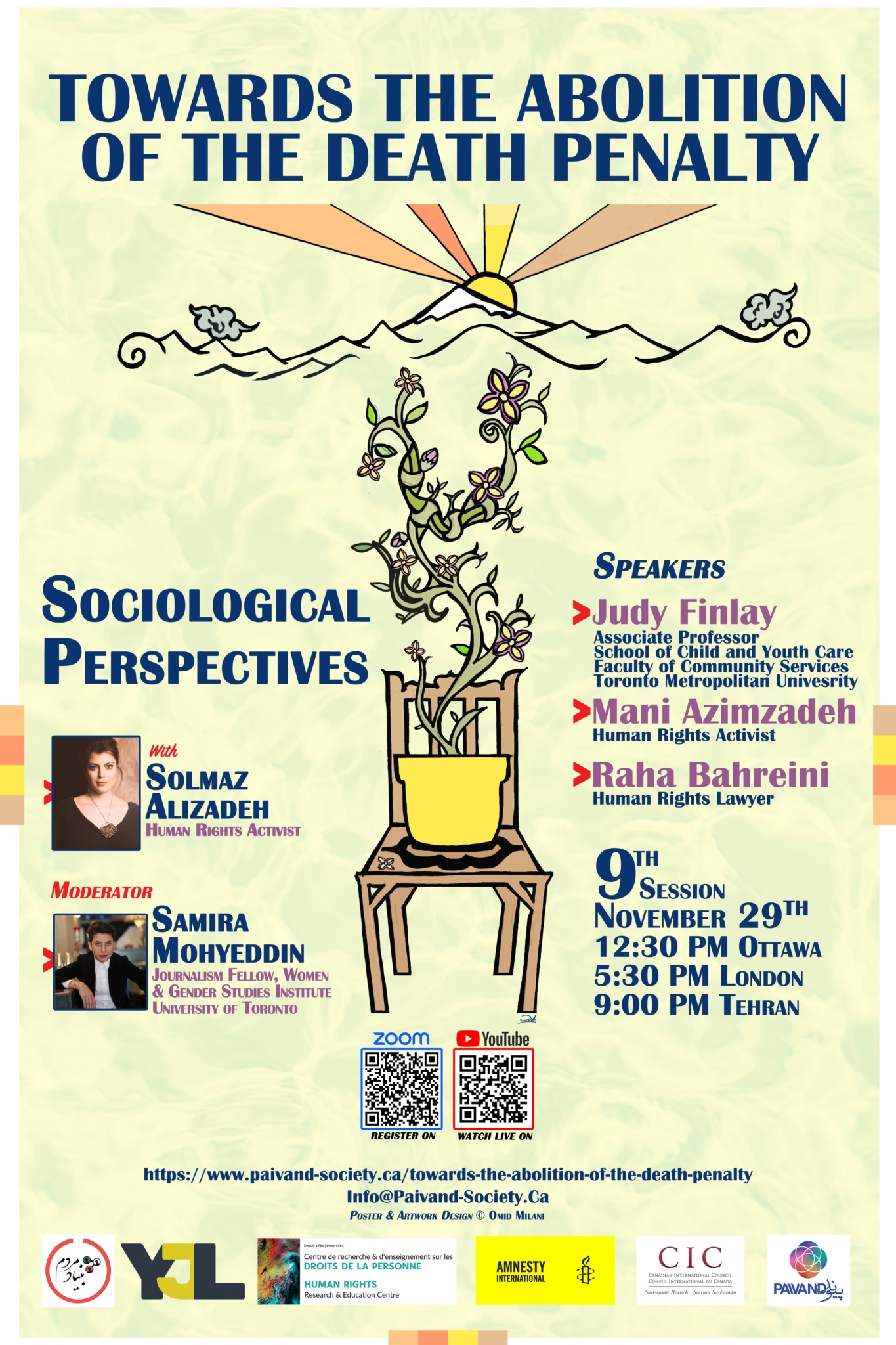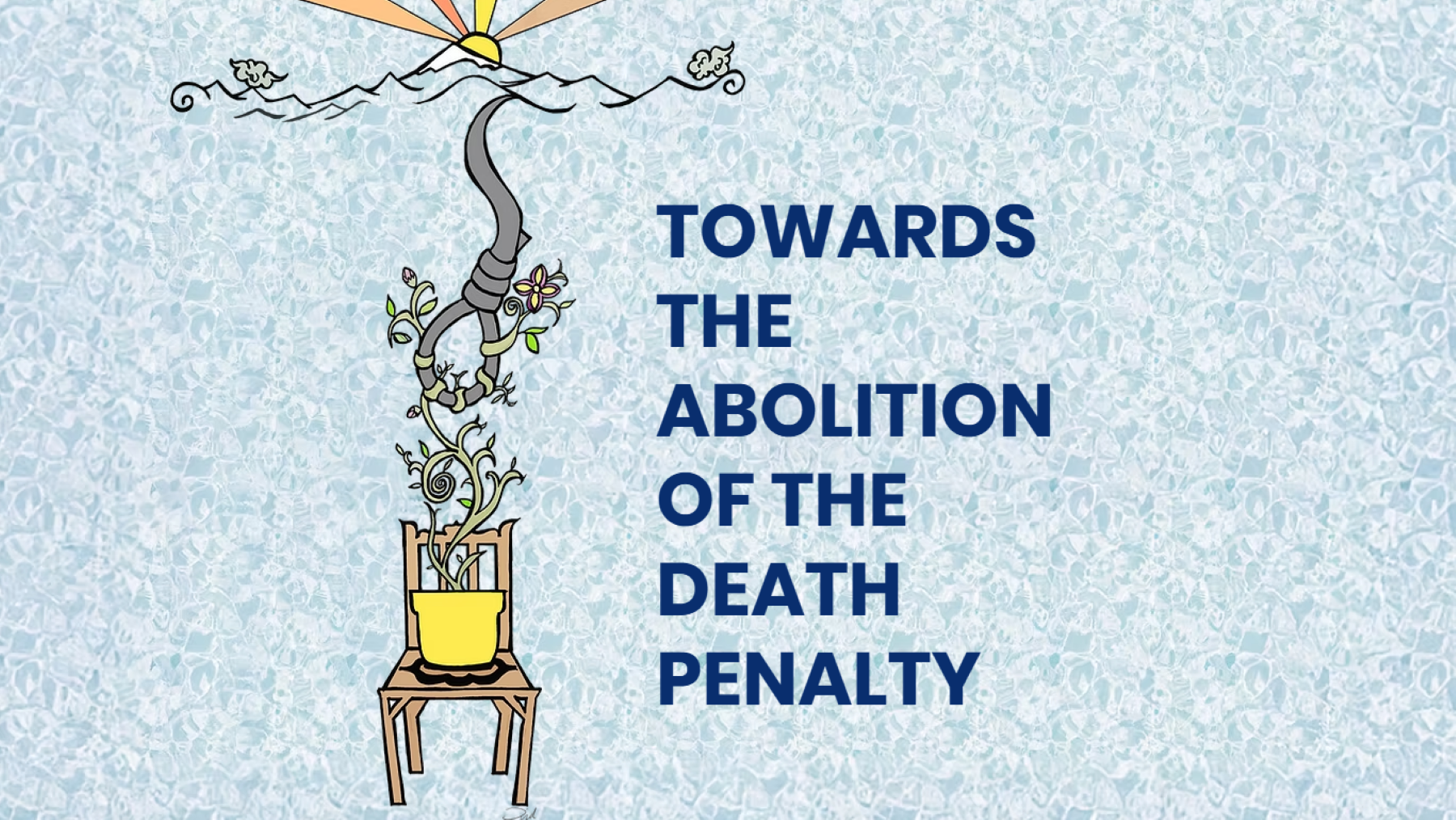Please join us on Saturday, November 29, 9:30 PDT, 10:30 CST, 12:30 EDT,1:30 ADT for the ninth webinar in this ongoing series on the abolition of the death penalty. This series is sponsored by Amnesty International Canada, Carleton University’s Youth & Justice Lab, The Human Rights Research and Education Centre at the University of Ottawa, The Canadian International Council (Saskatchewan Branch), The Mardom Foundation, The Paivand Society and the campaign United Against Executions in Iran.
The death penalty is deeply embedded within sociological and sociolegal structures of power that shape its justification, administration, and endurance. A sociological inquiry into this sanction is essential to understanding the complexity of the state’s use of lethal force and its connection to broader regimes of inequality. Personal narratives and lived experiences reveal that capital punishment disproportionately targets marginalized and financially disadvantaged social, racial, and identity groups, thereby reproducing systemic hierarchies of privilege and exclusion. These dynamics expose how state violence is legitimized and sustained through institutionalized discourses of justice and security. This session situates the death penalty within critical social theories, examining it as a site where class, race, and state authority converge to uphold the state’s hegemonic power.
.
Our Webinar Panelists and Moderator
Solmaz Alizadeh was born and raised in Tehran, Iran. She completed her bachelor’s and master’s degrees in Biophysics at the University of Tehran before immigrating to Canada in 2003 and settling in Toronto. She continued her academic journey at the University of Toronto, earning a Master of Science in Pharmacology in 2004. Solmaz is currently a Senior Manager of Market Access at Vertex Pharmaceuticals.
Her father, Mahmoud Alizadeh, was a political prisoner arrested in the early 1980s and executed during the mass killings of the summer of 1988. Solmaz has been an outspoken advocate for recognition of the 1988 massacre and has shared her father’s story and her own experience as a family member of one of the victims at various events and public forums.
Mani Azimzadeh is a member of the Iranian community in Toronto and holds a Master of Education (MEd) in Social Justice Education, with Collaborative Specializations in Sexual Diversity Studies, from the Ontario Institute for Studies in Education (OISE) at the University of Toronto. Having faced systemic discrimination throughout his youth for refusing to conform to the Islamic Republic’s ideological demands, as well as due to his sexual orientation, he became actively engaged in protest movements during his student years and afterward in Iran. Mani left Iran in 2011.
As a member of the queer community, Mani became an active contributor to the opposition during the Woman, Life, Freedom movement through his work with Simorgh, the Iranian Queer Community in Toronto. He also collaborates with a range of political opposition groups committed to democratic transformation in Iran. Mani also designs educational programming and courses focused on social justice, democratic engagement, and critical approaches to education.
He currently serves as a Program Manager in a Toronto-based non-profit organization in the field of social work, where he continues to advance his commitment to social justice within both the Iranian diaspora and the broader Canadian context.
Judy Finlay is an associate professor in the Faculty of Community Services, has been a faculty member in the School of Child and Youth Care since 2007. She is currently the co-chair and principal investigator of the Cross-Over Youth Project, which is designed to learn ways to interrupt the trajectory of youth in the care of the state from entering the youth justice system. Finlay’s current research (in which she is also the principal investigator) includes: Mamow Ki-ken-da-ma-win: Searching Together: Enhancing wellness through a partnership-based approach to child, family and community in First Nations in remote northern Ontario. She is a member of the Child and Family Services Review Board and Custody Review Board with the Social Justice Tribunal of Ontario. Finlay was the longest standing child and youth advocate in Canada and was Ontario’s chief advocate from 1991 to 2007. She has worked for more than three decades in the areas of child welfare and children’s mental health. Finlay has participated in the development of children’s rights agendas, youth capacity building and leadership and community development in Mexico, Jamaica, Japan, Guatemala and Sierra Leone.
Raha Bahreini is an Iranian-Canadian human rights lawyer with an expertise in international human rights law. Since 2014, she has worked as Amnesty International’s researcher on Iran. Before that, she assisted the work of the UN Special Rapporteur on the Situation of Human Rights in Iran. Bahreini’s work has engaged with a wide range of human rights issues including the death penalty, freedom of expression, association and assembly, torture, women’s rights, discrimination against minorities, gender identity and sexual orientation rights, and transitional justice.
Our moderator Samira Mohyeddin has a Master of Arts in Modern Middle Eastern History and Gender from the University of Toronto and Genocide Studies from the Zoryan Institute. She is the inaugural 2024 / 2025 Journalism Fellow at the University of Toronto’s Women and Gender Studies Institute. Samira is an award-winning journalist and producer. For nearly ten years she was a producer and host at CBC Radio and CBC Podcasts. She resigned in November of 2023 and founded ‘On The Line Media’.

Upcoming webinars in this series on the abolition of the death penalty
Towards the Abolition of the Death Penalty is a virtual panel discussion series that tackles the complex question of the death penalty with a view to its abolition in retentionist states, particularly in the contemporary context of the Middle East, in Iran, Saudi Arabia, Afghanistan, Egypt, Syria, and Iraq. The panel series provides in-depth discussions on the death penalty from diverse legal, philosophical, sociological, psychological, and political perspectives. The speakers address and put in context current instances of the death penalty, exploring the dynamics involved in this criminal sanction. The series aims to create a dialogical platform for everyone interested in engaging with the abolitionist discourse to discuss the possibilities and challenges to put an end to the death penalty. Each session introduces the audience to significant aspects of capital punishment, expounding theoretical and practical particularities of the sanction.
December 10 – Session 10, Non-Violence and Forgiveness (Human Rights Day)
Roya Boroumand, cofounder and executive director of the Abdorrahman Boroumand Center for Human Rights in Iran
Bahar Saba, senior researcher on Iran and Kuwait at Human Rights Watch
Omid Milani, Fellow, Human Rights Research and Education Centre, Artist, University of Ottawa
Note: dates and speakers subject to change
Poster & Artwork Design © Omid Milani





















